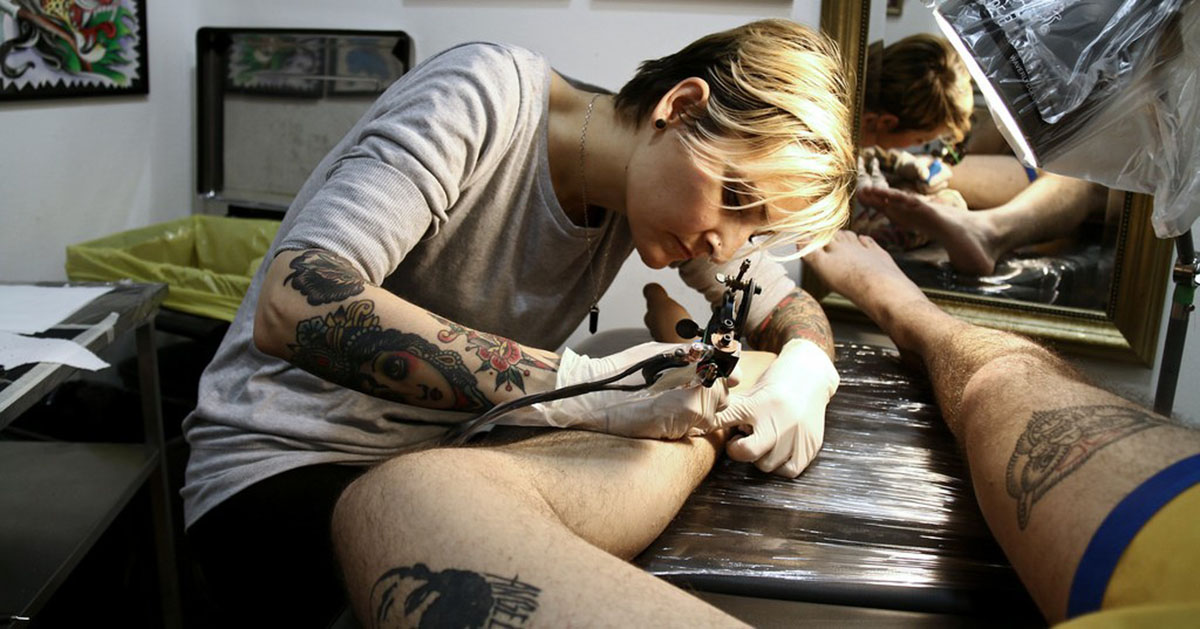Table of Contents
Keeping Things Individual
There is, of course, more to tattooing than needles. Tattooists order different colors of ink in large quantities. Inks come in bigger and smaller containers. Were a tattooist to dip individual sets of needles into those collective pots every time they did a tattoo, the ink would be a cesspool of nastiness.

Instead, your tattooist should use little disposable cups called ink caps, into which they pour the inks they think they'll need for your tattoo. Any excess ink should be disposed of. This way, your ink really is just your ink, and it isn't mixed with anyone else's blood. Ink caps should also be used for deodorant (often used to help create that initial pen impression of your tattoo design on your skin) and the Vaseline your tattoo artist will probably rub onto your skin while they tattoo you.
The Studio, Tools, And The Tattooist
Are you happy with the condition of the needles and the inks? Now turn your attention to the rest of the studio. My tattooist uses disposable covers on the "tattoo chair", again to prevent customers from coming into contact with biohazards. I have this near-compulsion where I really want to touch a fresh tattoo. It's annoying when my tattooist tells me not to do that and sends me to wash my hands immediately when I do it anyway, but it's also another sign that he can be trusted. He doesn't want me touching my bloody skin and then running my hands along surfaces other people will be coming into contact with.
Now for the big stuff: ask about your tattoo studio's autoclave. Tattooists should really have steam autoclaves, and they should be very, very happy to show them to potential customers. Recent spore tests should be able to demonstrate that the autoclave is actually clean.
The tattooist should always wear gloves, which he should take off and drop into a biohazard container as soon as your tattoo is finished and wrapped up. They should also be vaccinated against Hepatitis B.
What Else Should I Know Before Getting Inked?
As a global community, we don't want to focus on any one country or jurisdiction here at SteadyHealth. Tattoo regulations vary widely across different countries, from none at all to very many. The more heavily tattooing is regulated where you live, the more likely it is that the first studio you randomly walk into is safe. Every country has its fair share of illegal, unsafe tattoo parlors and DIY scratchers, however. Stay away from those.
See Also: Temporary Tattoos and Henna/Mehndi
Remember, even a safety-conscious tattooist might be a bad match for you, and many tattooists have their own specialties. Always look for samples of work and search the internet for reviews. You'll often find tattoo forums where different artists are discussed, and these can be really useful. You'll also want to ask how long your artist has been in business, where they learned the trade, and from whom. This should, along with previous work samples, give you more of an idea about what to expect.
Finally, having safety covered has absolutely nothing to do with what you'll think about your ink in five or 10 years time. Tattoo removal may be popular, but it's not perfect by any means and its price makes it beyond the reach of many. Cover-ups can be excellent, but some tattoos are really hard to cover up. Always consider any ink you get to be permanent, and do consider how your tattoos may change along with your body.
- Photo courtesy of Joy dela Cruz by Flickr : www.flickr.com/photos/freakychick/86754524
- Photo courtesy of yomo 13 by Flickr : www.flickr.com/photos/yomersapiens/14038828206


Your thoughts on this